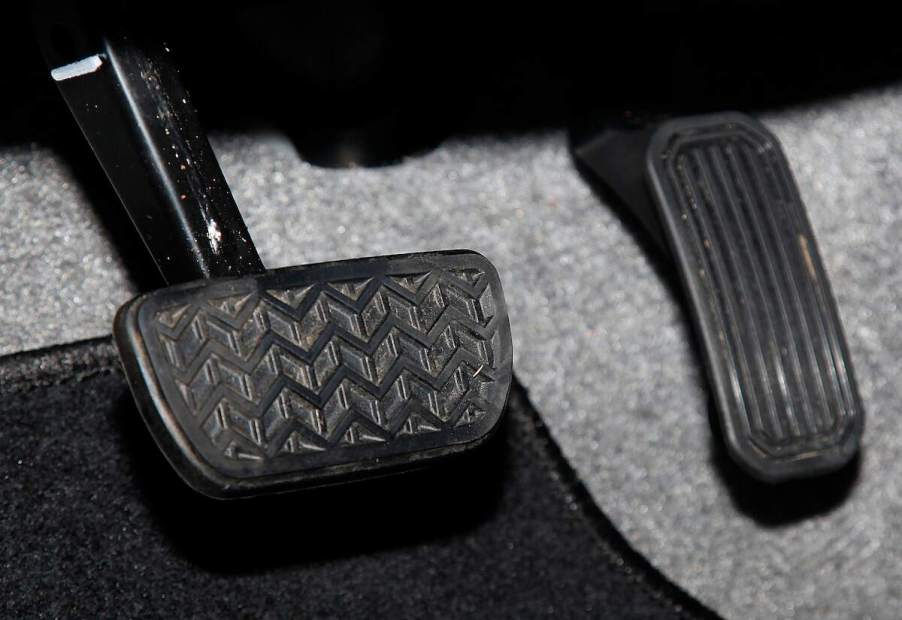
5 Reasons Why Your Car Might Have Spongy Brakes
Few things are more alarming than when your car’s brakes don’t work correctly. Though you might not be in immediate danger, don’t ignore soft or spongy brakes. If the pedal feels mushy or drops closer to the floor, get your vehicle checked ASAP. But to avoid being overcharged for a misdiagnosis, here are several reasons your brakes might not work properly.
1. Your brake lines are full of air

If your vehicle’s brake lines become filled with air, the brake fluid won’t flow properly. As a result, the brake pedal might feel less firm than usual.
To fix this problem, you or your mechanic must flush the brake fluid. This process is known as bleeding the brakes. It’s also a good practice to prevent old brake fluid from reaching a boiling point. When it does, the brake pedal might also drop close to the floor.
And periodically flushing the brake fluid and refreshing the supply can help preserve other brake components. Changing that fluid should be a part of your car’s regular maintenance routine and can help prevent spongy brakes.
2. Your brake lines are leaking or damaged
Brake lines can become corroded over time. When they do, they might develop small holes allowing the brake fluid to leak. And as that leaks, the hydraulic pressure drops. As a result, the brake pedal will feel less firm or drop lower to the floor, Firestone Complete Auto Care explains.
If that’s the case, you must change the brake lines. You can have them patched temporarily if necessary. But patching is only a short-term solution. Specialty hydraulic system glues and adhesives can be used to that effect. But these materials must not get into the line. Otherwise, you could damage the brake system components.
Consider patching if you still have fluid in your system and need to get your vehicle to a mechanic. But driving with patched brake lines carries risks. To fix the problem correctly, your mechanic must replace the damaged section of the brake line.
3. Your master cylinder is worn
The master cylinder is the key to your car’s braking system. It holds the brake fluid and generates hydraulic pressure from the pressure you apply to the pedal by pushing fluid into the circuit.
As a metal-based mechanical component, it can become worn over time. When it does, it can develop leaks. And as with damaged brake lines, a leaking master cylinder will result in a soft brake pedal. It’s unsafe to drive with a bad master cylinder, so if you suspect that might be the problem, take your vehicle to a mechanic as soon as possible.
Unlike brake lines, master cylinder leaks can be repaired in some cases. But depending on the damage, you might need to replace it entirely. In either case, if your master cylinder has gone bad, repairing or replacing it should fix spongy brakes.
4. Your antilock braking system is malfunctioning
Antilock braking systems (ABS) are standard in today’s vehicles. But some components are prone to malfunction in ways that can cause a soft brake pedal.
Specifically, the component known as an ABS modulator is filled with multiple valves and solenoids. When one or more fail, become corroded, or accumulate debris, the brake pedal might feel mushy.
The repair depends on the cause of the ABS failure. In some cases, cleaning out the debris can remedy the issue. In other cases, the modulator might need replacing. A module can cost as much as $1,000. But failing to replace it can cause your brakes to not only feel spongy but also lock up entirely. If you need to get a new ABS, don’t delay; you could be putting yourself and others at serious risk.
5. Your wheel cylinders are leaking
Another common issue is that the wheel cylinders are leaking. If your vehicle has drum brakes on the rear wheels, the shoes inside the drum brakes get pushed against the drum by the wheel cylinder’s pistons due to the hydraulic pressure generated every time you step on the brake pedal.
If the wheel cylinder gets corroded, it will develop holes and leaks. The wear and tear from the mechanical motion can also wear down the cylinder over time, leading to leaks. Both factors can result in soft or spongy brakes. And depending on the issue, you might be able to rebuild a faulty wheel cylinder. Otherwise, you’ll need to replace it.
Whether the problem is a wheel cylinder or not, the resulting spongy brake pedal is a symptom you should never overlook or ignore. Faulty brakes put you, your passengers, and everyone else on the road in danger. If your brake pedal feels spongy or drops low to the floor, take your vehicle to a mechanic as soon as possible.


